Wisconsin Black Bears
Over 40 some years (NOT COUNTING EARLY YEARS AT THE DUMP) I’ve seen maybe 15 black bears in the Northwoods and each of those times was an awesome sight. Last summer, Monica and I had one of those incredible sightings when we were driving to Boulder Junction on County B and spotted a bear 30 yards off the road coming down from a tree, that was one of those Northwoods wildlife encounters that many people never see, so we consider ourselves lucky. I was also surprised by seeing this bear because it was around 2pm and really close to a house and a resort. Being that we have seen more bears in the last 3 or 4 years then we have in the past, has the bear population grown that much? You bet it has. In the late 1980s the estimated amount was about 9,000 black bears in the state, but last year the DNR reported an increase of black bear to be over 25,000. Even though their primary range is in the northern part of the state, bears are moving south into central Wisconsin and there have been sightings of black bear in most of the 72 counties in Wisconsin. WHY? As I wrote in passed topics, the habitat/food in the Northwoods can only support a certain number of bears. I would think, this is the reason why last year the state issued the third highest amount of bear permits (12,760 of the 138,000 license/lottery hunters that applied) in Wisconsin’s history, but only 2,922 bears were registered.
Should the state bump that number of hunting licenses for this year? I’m not an expert by any means, but I believe we should keep the number of black bears in the state that the habitat can support. Bears will travel to find enough food to survive, and this is why so many are being found in central Wisconsin. If something isn’t done soon, bears that are heading too far south will have to be harvested or relocated at some point. Again, I might be wrong, but how about issuing more hunting licenses in ZONES C, E & F? By doing so, this could help with bear human contact in agriculture and urban areas.
One misconception is Bears are only active at night. This isn’t always true. Depending on the month, bears are mostly active a few hours before sunrise and a few hours after sunset but can change their routine to avoid humans. Also, bears will take a few naps during the day but in warm weather, they will bed down at night on the ground in mossy areas to stay cool and have been known to sleep up in trees. Here’s 3 more misconceptions. 1) I have read cubs will leave their mother after 7 or 8 months. Truth is, Females breed every other year, and her cubs will stay with her until she is ready to mate again, so time spent with mama is 15 to17 months. 2) Female bears won’t share their territory with other bears, but males will. Depending on the time of year and habitat/food, some bears can be territorial, some can co-exist. 3) You can tell if a bear is in the area because they smell. THIS IS NOT TRUE. The only time a bear has an odor is during mating season (MAY/JUNE) when the males have a strong sent on the back of their necks that they rub on trees. I have smelled this and the only way to describe it as a strong musky odor. Otherwise, bears are very clean animals.
While I’m writing about bears, here are a few more facts.
* Males bears (BOARS) can weigh 250 to 400 pounds (STATE RECORD IS 780)
* Females bears (SOWS) weigh 125 pounds and normally won’t exceed 200 pounds.
* Bears can live 18 to 20 years, but some have been recorded at 30 years old.
* Their diet varies with habitat, but eat, green vegetation, nuts, fish, insects, acorns, berries and bears will eat meat.
* Bears can consume 11 to 15 pounds of food a day, but that number can jump to 30 pounds leading up to winter.
* Bears can run up to 30 mph, are good climbers and great swimmers.
* Their vision is only good up close, and they can see color. Their sense of smell is 7 times that of a hound dog, which is 300 times better than the average dog.
If you are lucky enough to see a black bear, I’m sure you will be as excited as Monica, and I were. Totally enjoy this type, but please keep a safe distance. What happens if you do run into a bear in the woods or around your house/cottage? I thought about that while writing this week’s subject, so next week’s topic will be on about bear encounters.




